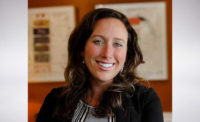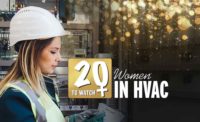Name/Title/Company: Nikki Krueger, director of marketing and business development, Santa Fe Indoor Air Quality Solutions/Therma-Stor
Age: 51
Educational Experience: Bachelor’s degree in communications
Professional Credentials/Accreditations: Certified RESNET Home Energy Rater
Organizational Affiliations/Achievements/Awards: Member of the ACCA Manual Low Load Homes (LLH) Advisory Committee, Building Envelope Committee for the Spray Polyurethane Foam Association, ACCA Residential Design for Quality Installation Certification, and currently serving on the 2024 National Green Building Standard update committee
What does your day-to-day job entail?
One of the exciting aspects of my role is that it rarely follows the same routine. I collaborate closely with our sales team and inside customer service team, leveraging my expertise to review Manual J and mechanical designs, offering recommendations for dehumidifier installations. I field inquiries on topics such as dehumidifier sizing, ventilation applications, crawl space installations, and more. Additionally, I work closely with our product manager, contributing to discussions on new product innovations, updates, and strategies for entering new markets.
When I'm not engaged in training presentations, I'm actively preparing for the next one. I'm fortunate to have a talented marketing team that helps execute our day-to-day initiatives, but, as the director of marketing, I also am focused on our long-term strategies. Daily, we review our current strategies to ensure they resonate with our target audiences, address their problems, and contribute to revenue generation. This ever-evolving and diverse set of responsibilities keeps my work engaging and rewarding.
What caused you to/when did you fall in love with engineering?
My journey into engineering was somewhat unconventional. I began my career with Therma-Stor in 2009 as a marketing manager for the company’s residential dehumidifiers, specifically Ultra-Aire and Santa Fe. Coming from a public relations background, I've always been driven to understand the "why?" behind things so that I could speak knowledgeably about them. I delved into the world of dehumidification and ventilation, exploring their applications and needs, which naturally led me to become curious about how buildings are constructed and how mechanical systems are designed.
I was determined to deepen my understanding of these areas, even though I hadn't been particularly strong in math or science. It was a challenge for me to tackle and comprehend; however, what I discovered was that I actually enjoyed math and science when I could apply them to topics I was passionate about. With the support of Todd Demonte, the president of Therma-Stor at the time, I became a home energy rater and obtained the ACCA Manual J certification. These marked a turning point for me, and I enrolled in as many ACCA and building science courses as I could find. This continuous learning built my confidence and enabled me to interact with mechanical engineers, HVAC contractors, architects, and builders to design systems that contribute to healthy, safe, sustainable, and comfortable homes on a daily basis. One of the most rewarding aspects of my journey has been the incredible people I've met and have the privilege of working with in this industry.
What has been the most rewarding/proudest aspect of your engineering career?
The most rewarding and proudest aspect of my career has been the opportunity it has provided me to explore my curiosities, cultivate a passion for lifelong learning, and share my knowledge with others. Every conference presentation, webinar, podcast appearance, interview, and article I have developed has pushed me to step out of my comfort zone and dive deeper into subjects, all in the pursuit of educating others and advancing the industry. I owe this approach to my greatest mentor, Ken Gehring, president emeritus, and one of the inventors of several industry-changing products at Therma-Stor.
Almost every week, I receive calls and emails from individuals who have watched my webinars or heard me on a podcast and want to discuss a project they are working on. Knowing that I've been able to make a meaningful contribution by sharing knowledge and helping others in their endeavors is incredibly fulfilling and reinforces my passion for the work I do.
What challenges do women face in this profession? Can you give a personal example? Why aren’t there more women in engineering? How can we increase the number of women in engineering?
Initially, I think the challenge that impacted me the most was finding other women to network with within the HVAC industry. Twenty years ago, I was not aware of an organization like Women in HVAC. You really had to make an effort to connect and seek out these relationships, as the majority of the time, you are working with men. When I would attend conferences and work our exhibitor booth, men would walk up and ask me to scan their badge and help find them someone that could answer questions for them. At first, this really upset me, but I learned how to ask questions that helped them realize I had the answers and knowledge they were looking for.
How many years have you been active in the engineering sector? What’s changed the most in that time? What’s changed the least?
I have been in the industry for approximately 20 years. What has changed the most is the focus on a building as a system and the importance of IAQ. What has changed the least is money that most builders and developers want to invest upfront to provide comfort, health, and property protection to their customers.
You’ve trained thousands of individuals on the topic of humidification/dehumidification over the years. How do you work to keep the content fresh?
The constant advancements in mechanical equipment, updates to industry standards, changing construction methods and materials, and evolving building and energy codes consistently provide new topics and areas to explore and discuss. I'm currently focusing on is the impact of incentives under the Inflation Reduction Act, which is leading to a greater need for supplemental dehumidification. Although dehumidifiers may not be directly part of the program, understanding how these incentives influence the industry and addressing the related challenges and opportunities is crucial. By staying informed about such developments and incorporating them into the training content, we ensure that the material remains fresh and relevant to the evolving needs of professionals in the field.
COVID-19 had a major impact on the indoor environment. How did it impact your job and the equipment your company has entered into the market?
The COVID-19 pandemic brought about significant changes and challenges for the indoor environment and the HVAC industry as a whole. First and foremost, we saw a heightened awareness of the importance of IAQ in homes. People were investing heavily in making sure their homes were healthy and comfortable. As a result, there was a surge in demand for HVAC equipment and solutions that could help improve IAQ, including dehumidification systems with air purification and ventilation features. I found myself providing more guidance and training on IAQ-related topics and how dehumidifiers could play a vital role in creating healthier indoor environments.
With in-person events and conferences being canceled or limited, we had to adapt to remote training and education methods. Webinars, virtual conferences, and online training became the norm, requiring adjustments in how we delivered content and engaged with professionals in the industry.
What drives/motivates you every day?
What drives and motivates me every day is the belief that I can make a significant impact in the HVAC industry. Being nominated as one of Engineered Systems' "20 to Watch: Women in HVAC," despite not having a degree in engineering but having developed the knowledge and skills necessary, serves as a testament to the potential for change and innovation within this field. I am fueled by a passion for sustainable and efficient HVAC solutions that contribute to a safer, healthier, and more productive world. The opportunity to inspire and empower other women to pursue careers in HVAC, to push the boundaries of what's possible, and to be a part of the ongoing transformation in this industry is what keeps me motivated and dedicated to my work each day.
What remains on your engineering bucket list — what do you aspire to do that you haven’t accomplished yet?
I would love to obtain the series of certifications to be an IAQ consultant.
What’s one thing no one knows about you?
I was the public relations director for RotoZip power tools back when the company was owned by the gentleman who invented the tool. We launched a smaller more ergonomically designed version for women. As part of the launch, I appeared on all three of the major network morning programs to demonstrate the tool. Back in 2000, it was a big deal for a power tool to be designed for women.
List any mentors who’ve helped you succeed and describe precisely how they’ve shaped your success.
Ken Gehring, president emeritus of Therma-Stor, has played a pivotal role in shaping my success in the industry, and I would not be where I am at without him. When I approach Ken with a question, I never anticipate a quick answer. Instead, he takes me on a learning journey, challenging me to thoroughly analyze the problem and consider all possible scenarios. His dedication to sharing knowledge has been a tremendous asset to my growth and development. Ken is an industry icon who has not only paved the way for many of us but also continues to inspire and drive progress in the field. His mentorship has been invaluable in shaping my success, and I am deeply grateful for his guidance and support.
Todd Demonte, chief innovation officer at Madison Indoor Air Quality (MIAQ), has played a significant role in my career and has been instrumental in my success within the industry. Whenever I approached Todd with a request to pursue certifications or take courses unrelated to my role, he not only encouraged me but also approved it without hesitation. His guidance and support have helped fuel my enthusiasm and confidence in tackling new challenges.
I am incredibly fortunate to have Chris Conway, president of Conway Energy, as not only my husband but also my mentor. Our lives are deeply intertwined in the building science industry, and the constant shoptalk we engage in has been instrumental in my professional growth over the last decade. Chris's support, encouragement, and patience have pushed me to reach new heights both personally and professionally.
Kimberly Llewellyn, emerging markets, senior product manager for Mitsubishi, has been a mentor by generously sharing her expertise, providing career advice, facilitating networking opportunities, championing my growth, and serving as an inspiration. Not only is she a mentor to me and numerous other women in the industry, but I am lucky enough to call her one of my best friends.
Sarah Botham, president of Botham Ink and an adjunct faculty member in the department of life sciences communication at the University of Wisconsin–Madison, was my first mentor in the field of marketing and public relations. During my college years, I had the privilege of interning under her guidance, an experience that profoundly influenced my career path and, indeed, my life's trajectory. Botham stands out as one of the most authentic individuals I've had the pleasure of knowing, with an unwavering dedication to nurturing relationships and investing in the growth of the next generation. To this day, she remains not only one of my closest friends but also a trusted confidant, mentor, and source of wise counsel. Her impact on my professional and personal development is immeasurable.
What advice do you have for prospective female engineers considering entering the field?
- Search for mentors who can provide valuable insights, share their experiences, and help you navigate the challenges you will encounter;
- Invest in yourself outside of your organization by taking classes, watching webinars, reading articles, etc. Be a lifelong learner;
- Find your niche and go all in; and
- Network, network, network. Attend conferences, join professional organizations, and engage in networking opportunities within the community. Building a strong professional network opens doors to lifelong friendships and career advancements.





